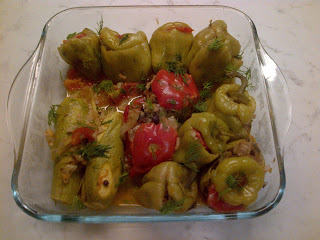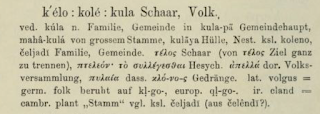We have today 3 words of Turkish origin beginning with ‘DOL’DOLMADOLMANDOLMETSCHWe begin with the shortest one:DOLMAA kind of food.DOL-MA consists of 2 parts: Root + affixDol- means to get full and affix -ma indicates the act of (the verb). In our case "the act of filling" or "the act of getting full"..
You take a paprika or zucchini, color doesn’t matter, and FILL it with rice, spices, parsle... and at the end you have DOLMA.
(My Mom cooked this food always without meat).
*(She always said: you can call yourself a good cook, boy, when you cook without meat and it still tastes good).The Versions like Dollma, Tolma, Dolmades or Dolmeh have Turkish etymological and cultural origin.
The well-known small busses in Turkey are called ‘dolmuş’ and this is a derivation from the root DOL-, meaning ‘already full’.
*The 2nd one sounds like the first one but has a very different meaning.DOLMANOriginally a kind of long dress, robe.
Sultan and 2 Followers wearing DOLMAN DOL-(A)-MAN consists of 2 parts: Root + affixDola- means to wrap (German wickeln) and derivative affix –man shows the relation of the subject/object to the verb like=> he who ‘does’... or that that ‘does’ … (Egitmen: he who trains, Dolaman: that that wraps).*The names of the other shapes and versions are ale derived etymologically from this Turkish one, like => dołman, dołoman, dolmány, Dólmã, Доломан, dolma...
 |
| Woman's dolman mantle, front & back views. Harper's Bazaar, November 1871 |
*
The 3rd one is a different one. It is a human!
Dolmetsch or Dolmetscher is a German word for Translator or Interpreter. The Urform of this word is the Turkish word DIL meaning the tongue and the affix -maç makes from the verb a profession. TILMAÇ or DiLMAÇ means the translator, too.
The words like tolmács, толмач, tolmač, тумач/tumač, tłumacz, tlumočník, тлумач or товкмач and tălmaci, they have all this root DIL, the tongue.
Extra Knowledge: The old form of Latin Lingua is Dingua.
I am sorely disappointed by DUDEN because he writes:
Duden says that the origin of this word from a Near East Language.
Na na na Dude, you can do it better, I think... Turkish ist the key word you are looking for...
Uzunbacak Adem
* Pic Source: Wikipedia









































